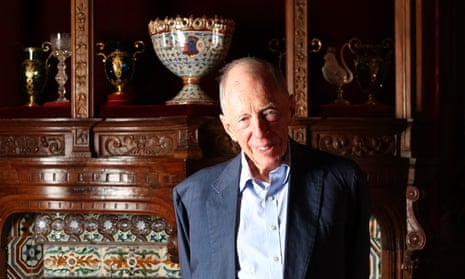Jacob Rothschild, Lord Rothschild, who has died aged 87, combined a ruthlessly successful business career, following in the family tradition as a financier in the City of London, with philanthropic projects. These mainly centred on the arts and heritage, including the restoration of the dynasty’s enormous 19th-century replica of a French chateau Waddesdon, in the middle of the Buckinghamshire countryside.
Although he claimed that for a lot of his life he had lived without luxury – true up to a point following the acrimonious breakup of his parents’ marriage when he was nine – he had a gilded entrance into the family bank, and by last year his wealth, built on shrewd investments and an inheritance, was estimated to be worth at least £825m. He protested to an interviewer that he certainly knew how to open a tin of baked beans, but his portfolio also included the Eythrope estate next to Waddesdon, a share of a vineyard in France, a villa and 30-acre estate on Corfu and a house in Knightsbridge, London.
He told the Sunday Times in 2012: “Look, we are not as wealthy as families who live abroad and pay no tax and we are believers in the Great Society. I have spent a large part of my life keeping things going.” He even expressed sympathy for the Occupy movement in the same interview: “You can’t tolerate a society where youth unemployment goes into the high 20%.”
The family’s wealth was built up over two centuries, from when Nathan Rothschild was sent from Frankfurt in 1798 to buy Manchester cotton textiles and stayed to set up a counting house in the City of London. It was so successful that it would underwrite the cost of the British army’s campaign at Waterloo and later the purchase of the Suez canal, resulting in a peerage for Jacob’s great-grandfather, another Nathan.
Born in Cambridge, Jacob was the son of the zoologist, wartime counter-espionage officer and later Downing Street thinktank head Victor Rothschild and his first wife, the artist Barbara Hutchinson, who was involved with the Bloomsbury set. After the marriage broke down, Victor took out his annoyance on Jacob and his sisters Sarah and Miranda. Jacob suffered a bout of polio and emerged as a diffident, quietly spoken but strong-willed adult. He was educated at Eton and studied history at Christ Church, Oxford, emerging with a first-class degree before undertaking national service in the Life Guards.
Instead of the academic career that he might have had, he joined the family firm, the merchant bank NM Rothschild, in 1963, after basic training with other City firms to learn the ropes. In coming years he pressed for the bank to become more adventurous and competitive: “a bank of brains” in seeking and making deals, such as he masterminded in gaining the contract to finance the Trans-Alpine pipeline in the mid-1960s and arranging Grand Metropolitan’s takeover of the brewers Watney Mann (1972).
But when the chairmanship of the bank became vacant in 1976 his father championed his staid older cousin, Evelyn, and Jacob took over the running of the bank’s small investment trust instead. He built it up from a capitalisation of £5m to one with assets of more than £3bn, the largest such trust in Britain by the time he retired in 2019. Not all his deals came off: the attempted Guinness bid for Distillers in 1986 failed spectacularly – though he personally was exonerated of boosting Guinness’s value to assure the takeover. A £13bn attempt to win control of British American Tobacco in partnership with Sir James Goldsmith and the Australian media tycoon Kerry Packer in 1989 also failed.
By the late 70s he had bitterly fallen out with Evelyn, sold up his shares in the bank and took the investment trust independent with a new name, J Rothschild Holdings, and a new headquarters in St James’s, where it continued to make deals, eclipsing the bank and benefiting eventually from the privatisation programme of Margaret Thatcher’s government.
Among the companies and acquisitions he bought into were plantations in Asia, property in Paris, the Paypoint electronic system, the Economist magazine and Coats Viyella textiles. In 1988 the company split into St James’s Place Capital and RIT Capital Partners. RIT took a lease on Spencer House, the ancestral London home of Princess Diana’s family, overlooking Green Park, and renovated the property.
In 1990 Jacob succeeded to the peerage on the death of his father (who left him only an ink stand in his will). The previous year his cousin, Dollie de Rothschild, had left him her £90m fortune and by then he had also assumed control of the Rothschild Foundation, which runs Waddesdon Manor, the house having been bequeathed to the National Trust in 1957.
Rothschild’s cultural philanthropy had been evident for years: Goldsmith said: “It depends which day it is: on one Jacob is an excellent banker, the next he is absorbed by art and heritage.” He himself said he read art catalogues like others read comics, and he was an enthusiastic collector, starting with a Giacometti artwork at the age of 22. He chaired the National Gallery trustees for six years from 1985, commissioning new architects to build the gallery’s extension after Prince Charles criticised the original design as being a monstrous carbuncle. Later he would chair the National Heritage Memorial Fund (1992-98) and the Heritage Lottery Fund (1995-98), enabling the renovation and opening up of Somerset House in central London.
A member of the Reform Jewish synagogue and president of the Institute of Jewish Affairs, Rothschild also inherited the family’s Israel charity, Yad Hanadiv, which has funded the building of the Knesset, the Israeli supreme court and national library as well as educational projects for Jewish and Arab children. He was knighted in 1998 and four years later appointed to the Order of Merit.
In 1969 he married Serena Dunn. She died in 2019, and he is survived by their four children, Nathaniel, Hannah, Beth and Emily.
